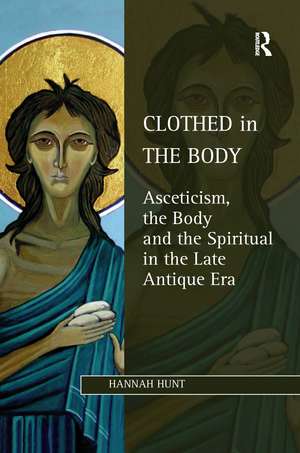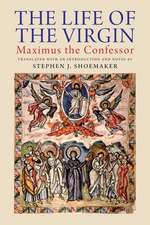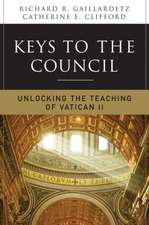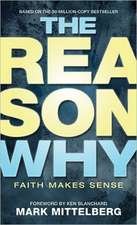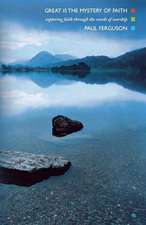Clothed in the Body: Asceticism, the Body and the Spiritual in the Late Antique Era: Studies in Philosophy and Theology in Late Antiquity
Autor Hannah Hunten Limba Engleză Paperback – 22 mai 2017
| Toate formatele și edițiile | Preț | Express |
|---|---|---|
| Paperback (1) | 469.34 lei 6-8 săpt. | |
| Taylor & Francis – 22 mai 2017 | 469.34 lei 6-8 săpt. | |
| Hardback (1) | 1060.25 lei 6-8 săpt. | |
| Taylor & Francis – 28 iul 2012 | 1060.25 lei 6-8 săpt. |
Din seria Studies in Philosophy and Theology in Late Antiquity
-
 Preț: 327.29 lei
Preț: 327.29 lei -
 Preț: 389.38 lei
Preț: 389.38 lei - 13%
 Preț: 324.86 lei
Preț: 324.86 lei -
 Preț: 436.14 lei
Preț: 436.14 lei -
 Preț: 436.14 lei
Preț: 436.14 lei -
 Preț: 389.66 lei
Preț: 389.66 lei -
 Preț: 469.34 lei
Preț: 469.34 lei -
 Preț: 390.25 lei
Preț: 390.25 lei -
 Preț: 384.86 lei
Preț: 384.86 lei
Preț: 469.34 lei
Nou
Puncte Express: 704
Preț estimativ în valută:
89.81€ • 94.00$ • 74.75£
89.81€ • 94.00$ • 74.75£
Carte tipărită la comandă
Livrare economică 31 martie-14 aprilie
Preluare comenzi: 021 569.72.76
Specificații
ISBN-13: 9781138115941
ISBN-10: 1138115940
Pagini: 256
Dimensiuni: 156 x 234 x 14 mm
Greutate: 0.45 kg
Ediția:1
Editura: Taylor & Francis
Colecția Routledge
Seria Studies in Philosophy and Theology in Late Antiquity
Locul publicării:Oxford, United Kingdom
ISBN-10: 1138115940
Pagini: 256
Dimensiuni: 156 x 234 x 14 mm
Greutate: 0.45 kg
Ediția:1
Editura: Taylor & Francis
Colecția Routledge
Seria Studies in Philosophy and Theology in Late Antiquity
Locul publicării:Oxford, United Kingdom
Cuprins
Contents: Introduction; Greek insights into the human person; Biblical understandings of flesh, body and soul; Desert teachings on the body and asceticism; 'Virgins of God': manly women and transvestite saints; 'Enemy' or 'friend': Climacus' integration of the body; The Syrian perspective on asceticism; Key Syrian sources: apochrypha and anonymity; Pseudo-Macarius, Messalianism and synaesthesia; 'Clothed in the body' as a metaphor for incarnation; Heterodox Christologies and the heresiarchs; Orthodox patristic formulations; Conclusion; Bibliography; Indexes.
Notă biografică
Hannah Hunt is an established academic and author working in Eastern Christian spirituality and doctrine, with a monograph, four chapters in other books (Spirituality in Late Byzantium (Cambridge Scholars, 2009), The Westminster Handbook to Origen (Westminster John Knox (2004),The Blackwell Companion to Eastern Christianity (Blackwell, 2007) and The Philokalia: Exploring the Classical Text of Orthodox Spirituality (OUP, 2012)) and a number of papers already published (including in Studia Patristica, The Harp, St Ephrem Theological Journal, Medium Aevum and the on-line journal Hugoye). She is also in demand as a reviewer, for example for Pennsylvania University Press's Divinations series, and was recently invited to comment on a manuscript for Oxford University Press. She has been working on aspects of asceticism and religious anthropology in Klimakos, St Paul, Ephrem and Isaac the Syrian in particular for some time now, presenting work in progress to conferences such as the International Medieval Congress, the International Patristic Conference and the British Patristics Conference as well as the American Society of Church History, and conferences in Durham (2006: on reception of the desert fathers) and Oxford (Postgraduate Medieval Conference 2008). In addition to working on her current book, this year she has been working on papers on Symeon the New Theologian, Sarx and Soma in St Paul, images of harvest and cultivation in biblical and Syrian texts and the co-editing of a book on the reception of the Desert Fathers. In her spare time she is a half-time Senior Lecturer in Theology and Reader in Eastern Christianity at Leeds Trinity University College and also has four jobs for the Open University (teaching two English Literature courses and a Religious Studies course, and Acting Senior Faculty Manager for the Arts in Yorkshire).
Recenzii
'Clothed in the Body is a fresh, illuminating, and provocative study at the junction of christology and anthropology. Hunt explores, with keen vision, the tension between dualistic and holistic views of Christ and ourselves. Engaging Jewish and Greek anthropology, the Christian ascetic literature of the desert, the christological debates and formulations of the fourth and fifth centuries, and contemporary scholarship on the human person, Hunt makes an important contribution to current conversations on the body and the incarnation.' Brock Bingaman, Assistant Professor of Religious Studies, Wesleyan College, Macon, Georgia, USA 'In her earlier book, Joy-Bearing Grief (2004), Hannah Hunt has shown herself to be a sensitive interpreter of the Greek and Syriac Fathers for the modern reader. In this present, thoughtful study she turns to a central issue in early Christian thinking and explores the relationship between different attitudes to the body and the search for a balanced understanding of the unity of the two natures in the incarnate Christ.' Sebastian Brock, Emeritus Reader in Syriac Studies, Oxford University, UK 'This monograph is certainly an important contribution to the study of the relationship between asceticism and Christology in early Christianity. Scholars and informed readers alike will find both compelling observations and areas for further inquiry.' Anglican Theological Review '[A] comprehensive and educative book...' Journal of Theological Studies
Descriere
This book explores religious anthropology and asceticism from its biblical and desert roots and within eastern patristic writers including Ephrem, Pseudo-Macarius and Climacus. Hunt examines the apparent paradox that Jesus' earthly existence and post resurrection appearances are experienced through consummately physical actions and attributes yet some ascetics within the Christian tradition appear to seek to deny the value of the human body, to find it deadening of spiritual life.
